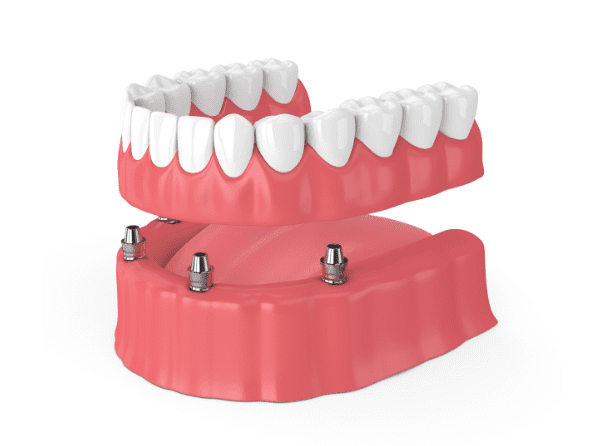If you are missing multiple teeth or a full arch of teeth, dentures may be right for you.
Dr. Matthew Jenne and our professional dental team offer full and partial dentures to patients in the Garner, North Carolina area. Dr. Jenne works with patients one-on-one to discuss their concerns and to find a treatment option that works well with their budget and specific oral health needs. Learn more about dentures as restorative dental solutions below.

Types of Dentures in Garner
Full Dentures: Full dentures replace upper or lower teeth. This type of denture can be fixed or removable. Fixed dentures are anchored by dental implants, which increase the success rate of the denture.
Implant Dentures: Implant dentures offer a number of benefits compared to removable dentures. There is no chance of slipping, and no adhesive is needed. Patients are able to eat without restrictions as the implants are secure and durable. Implants improve the health of bone and gums for a more natural form and function.
Partial Dentures: Partial dentures are often used to replace several missing teeth. Like full dentures, they can either be fixed or removable. A fixed partial denture may be secured in place with dental crowns or dental implants.
The Dentures Process
The process of getting dentures at our office depends on the type you’re getting. If you’re getting implant-supported dentures, we start with surgical implant placement. We’ll place 4-8 dental implants in the jaw, waiting 3-6 months for the posts to osseointegrate with the jawbone. You’ll most likely have a temporary restoration while this process is happening.
The lab makes a custom denture that fits the specifications of your mouth. The teeth can be whatever shade you desire. We can make recommendations based on what will look natural with your face and skin tone. When the implants are healed, you’ll come into the office for us to attach your permanent denture.
For traditional dentures, the lab will make your denture based on impressions of your mouth. It’ll take about 2-3 weeks. Once the denture is ready, you’ll return to our office for a fitting. We’ll make any small adjustments if needed. We can also recommend adhesives and show you cleaning techniques to ensure you can care for your new denture properly.
Traditional vs. Partial Dentures
Traditional dentures and partial dentures can offer different benefits to our patients. Partials are ideal for patients who are missing several teeth. Full dentures are a good option for patients who are missing most of their natural teeth. Dentures can be removable or fixed, and full dentures can be secured by dental implants.
Partial dentures are removable and attached to an acrylic and metal frame that is secured onto the remaining teeth. Dr. Jenne will help you determine which option is right for you during a consultation.
Implant-Supported Dentures
Whenever possible, we recommend implant-supported dentures. They have many benefits that you can’t get with any other type of denture.
Superior Stability, Function, and Jawbone Preservation
With implants, you get unmatched stability. Implants replace tooth roots, anchoring them firmly in place. They function more like normal teeth than traditional dentures. You can successfully chew a steak and speak in public without worrying about your denture slipping or falling out. While traditional dentures give back 30-40% of your bite function, you get up to 90% of your bite function back with implant dentures.
It’s difficult to chew many foods with traditional dentures. You can’t successfully break down things like crunchy, fresh fruits and vegetables. This limits your diet, and you may not be able to eat some of your favorite foods anymore. It can also lead to nutritional deficiencies because you’re unable to have a varied, nutritious diet.
Because implants simulate tooth roots, they stimulate jawbone growth and regeneration. With traditional dentures, nothing is stimulating the bone structure. The jawbone continues to deteriorate, resulting in a sunken appearance in the face and a weakened jawbone. You’ll likely need to get dentures relined or replaced multiple times throughout their use, as the jawbone continues to change.
Comfort, Convenience, and Confidence
One of the biggest issues with traditional dentures is the comfort level. If you wear the dentures for too long, they can rub your gum tissue and irritate it. The chewing forces of your bite will directly impact the soft gum tissue in your mouth. This is why you have to take them out each evening, to give your gums a chance. Wearing them too often can lead to mouth sores and other issues. Implant dentures don’t rest directly on the gums.
Traditional dentures often require an adhesive to stay in the mouth properly. This assists with suction and limits movement. Using adhesive also leads to more care. You have to take the dentures out of your mouth each evening and diligently clean the adhesive off them using a special brush.
Traditional dentures also require you to soak them in a special solution overnight. They need to stay hydrated, or else they crack and develop issues with function and comfort.
With implant dentures, you simply follow a normal oral healthcare routine. They stay in your mouth, so you don’t have to worry about removing them every night. We may need to teach you ways to floss around the denture, but otherwise, you can brush your teeth like normal.
A stable, well-fitting denture boosts confidence and overall mental health. You can be confident eating and speaking in public without worrying about any denture mishaps. There’s a better quality of life because of this and the ability to still eat all of the foods you love. You can go about life as you normally would.
Dentures FAQs
Dentures are the best way to replace a full arch of missing teeth. Learn more below.
Do dentures cause bad breath?
No. Wearing dentures every day does not directly cause bad breath. However, dentures that do not get cleaned every day can contribute to bad breath and gum issues. There are many products out there that can help you maintain clean dentures, but they are not always necessary. Cleaning your dentures with toothpaste and mouthwash can reduce the amount of stuck-on plaque and bacteria that cause bad breath.
How do I clean implant-supported dentures?
Since this type of denture is not removable by the wearer, it may seem harder to clean. This is not the case as mentioned before, you do not need denture products to maintain a healthy denture. Brush your teeth at least twice a day, use mouthwash for implant dentures, and floss under the dentures daily.
Can I sleep in dentures?
Yes. Sleeping with dentures is acceptable as long as you are careful and aware of the side effects. Sleeping with your removable dentures for long periods of time can cause gum irritation. Removing your dentures before you go to sleep helps your gums and mouth get a break from them.
How many hours a day should you wear your partial denture?
Partial dentures should be worn during the day and removed at night. They should be worn for about 14-16 hours and removed for 6-8 hours at night. This gives your gums and mouth time to rest without dentures impacting them. It also gives you a specified time to clean and soak your dentures.
Will my face change with dentures?
After a couple of months of wearing your dentures, you may notice that your face shape has changed. This is due to the added structure and support that your dentures provide. It commonly makes patients appear younger.
What can you not eat with partial dentures?
Patients with partial dentures should avoid particularly sticky or chewy foods. We also recommend that patients avoid tough meat and chewing gum. This will minimize the damage that may impact the lifespan of your dentures.
Schedule a Denture Consultation Today
Do you want to improve the form and function of teeth? Replace your missing teeth for a fuller and healthier smile. Request an appointment with us online or call Dr. Matthew Jenne and our dental care team today at 919.238.3470. If you have any questions about treatment options, feel free to ask our dental staff. They will be happy to help.
